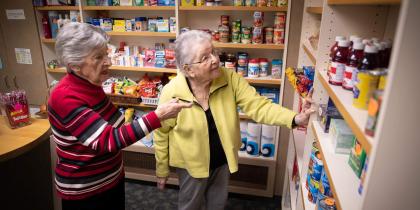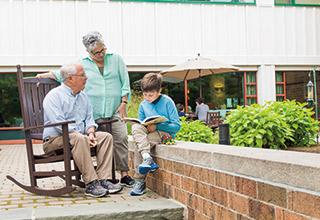Emergency Preparedness for Older Adults: Planning for Peace of Mind
Learn what to include in your emergency kit and how to prepare for the unexpected.

No one expects to face an emergency. But if an emergency does happen, preparation can make the unexpected more manageable in the chaos of a crisis. Having a plan in place can be lifesaving for older adults, who can be at greater risk during a crisis.
As the mother and caregiver to an adult child with a disability, recent disasters like the wildfires in California and flooding in the South made me realize I not only need to have a plan for my own evacuation, but also for my son. When you live with medically complex cases or a disability, the stakes are higher, and you need more preparation in everyday life.
The same preparedness is helpful for everyone, but can be critical if you’re an older person or taking care of a loved one with medical considerations. Whether it’s ensuring mobility, access to medical equipment, or vital medications, taking proactive steps can reduce fear and increase safety later. A thoughtfully packed “go bag,” clear documentation, and a communication plan can make a potentially chaotic situation more manageable.
What to include in your emergency kit
The more prepared you are, the less you have to worry in a crisis — and the easier it is to take care of yourself and your loved ones. Emergencies often strike without warning, so it’s critical to have everything in place beforehand.
Written checklists and instructions about medical conditions, precautions, allergies, or medications can give emergency responders the information they need, especially if someone is unable to communicate their needs in an emergency.
Tailor your plan to your unique needs
While some items are universally important, many are unique to your situation. That’s especially true for those with medical or mobility considerations. For example, my son’s condition requires specific, unique medical precautions. We have a laminated card attached to his wheelchair so that anyone giving medical care would be aware of necessary precautions in case of an emergency. The card indicates medications that can or cannot be administered and precautions that should be observed due to his disability.
Think about what you or the person you care for uses or needs daily. Make sure important documents are ready to go. Some people laminate or place these in waterproof pouches.
Documents to prepare:
- Government IDs (driver’s license or other identification, passport, etc.)
- Insurance cards
- Social Security card
- Medical records, including vaccination records and allergy alerts
- Advance directives such as MOLST or a health care proxy
- Financial documents (bank accounts, credit cards, wills, power of attorney)
- Real estate paperwork (lease or mortgage)
- An emergency contact list (name, relationship, phone number, and email)
Medications and medical needs:
- Any precautions, allergies, or protocols that may be lifesaving for a particular medical condition
- A seven-day supply of necessary medications
- A printed list with each medication’s name, dosage, and purpose
- Devices like hearing aids, glasses, portable urinals, and extra inhalers
- Backup mobility aids such as a walker, foldable wheelchair, or sling-style lift
Clothing and comfort:
- Weather-appropriate change of clothes
- Wool or compact emergency blankets
- Personal hygiene items
Food and water:
- One gallon of water per person per day, for at least three days
- Shelf-stable snacks, such as granola bars, trail mix, and crackers
- Special dietary items, if needed
- Food, water, and essentials for pets or service animals
Other essentials:
- Cash in small bills to cover expenses in case of ATM outages
- Phone chargers and cables
- Flashlight and batteries
- A whistle to signal for help
- Chargers for wheelchairs and any medical devices, such as breathing apparatus
- Backup communication devices if needed (e.g., emergency radios)
Large, easy-to-carry backpacks, duffle bags, and plastic bins can be good options for your emergency bag. If you find it difficult to lift or carry a bag, consider using a duffle bag with wheels.
Of course, not all emergencies are the same! While a home fire may require you to escape quickly, sheltering in place is often safest during other natural disasters. Still, it’s helpful to have an emergency kit that accounts for a variety of possibilities.
The importance of communication and coordination
Consider who else may need to be part of the response: neighbors, extended family, home health aides, or even building staff. If you rely on just one person to carry out a plan, a disruption in communication or availability could create delays or confusion. That’s why backup contacts, clearly documented procedures, and checklists are essential.
If you live alone, consider giving someone in your escape plan a key to your home so they can reach you if necessary. Also, update your plan if an aide starts working at home. Practice drills, even simple ones, can help reduce fear and increase confidence for everyone involved.
Communication is key to weathering any emergency. The time to have these conversations is before an emergency strikes. Everyone in the family and support network should be familiar with the plan and their role in it.
In Hebrew SeniorLife’s senior living communities, our security staff has observed that preparing for the unexpected means a lot more than just having a plan — it’s about communication! “It’s about fostering a culture of safety and resilience through open communications, all forms of training and exercises, and reminders that keep preparedness at the forefront. This approach is crucial because it helps us ensure the well-being of our residents and staff, enabling everyone to feel secure and supported in times of uncertainty,” says Victor Furtado, director of community security initiatives and emergency services at NewBridge on the Charles in Dedham, MA.
Other details to keep in mind
It is a good idea to review your emergency plan regularly during seasonal changes or when your or your loved one’s needs shift. Also, review important documents and update medications regularly — what was accurate six months ago may no longer apply today.
Disasters can disrupt the mail service for days or weeks. If you depend on Social Security checks, calling 800-333-1795 or signing up online for electronic payments is one way to ensure your financial security.
If you have an animal in your home, research pet-friendly evacuation centers — not every shelter will allow that family member in, and you don’t want to leave them behind!
Disaster preparedness resources for older adults
Ready.gov is an excellent resource for in-depth information on how to plan for a disaster. It offers disaster-specific details on scenarios ranging from power outages to flooding, wildfires, winter weather, hurricanes, home fires, and more. It also has a disaster preparedness guide for older adults and a disaster preparedness guide for caregivers with more tips and resources on emergency preparation.
The Red Cross offers resources on emergency preparedness for older adults, including practical steps to prepare for disaster and various resources to help you prepare.
The Alzheimer’s Association has tips for preparing for emergencies for people who have been diagnosed with Alzheimer’s and dementia. For example, preventing wandering may become a top safety consideration during emergencies.
Planning ahead is an act of care
Evacuating can be overwhelming when emergencies, natural disasters, or unexpected situations occur. Still, when you’re responsible for the safety and comfort of yourself or a loved one, preparation becomes even more critical.
Preparing for a crisis may feel overwhelming, but it’s a profound act of love and care. When you take the time to think through scenarios and make plans in advance, you give yourself and your loved ones a better chance at safety, dignity, comfort, and peace of mind. Emergencies are unpredictable, but your preparation doesn’t have to be!
Senior living where you can feel secure
At Hebrew SeniorLife, we’re proud of the extensive resources within our senior living communities. As part of the Massachusetts Mutual Aid Plan, which enables participating health care organizations to assist each other as needed during disaster events, we are committed to providing our residents and staff with strong support through comprehensive evacuation resources and strategies.
“Our goal is to empower everyone to face emergencies communally with confidence and care. We understand that anxiety often arises not from emergencies themselves, but from the reluctance to openly discuss and explore these important topics together,” explains Furtado.
Are you looking for senior living communities that offer peace of mind during the unexpected? Find a service or community online today to explore your options.
Join Our Community: Subscribe to the Hebrew SeniorLife blog for weekly insights on healthy aging and senior living.
Blog Topics
Learn More
Senior Living
Hebrew SeniorLife offers a variety of senior living options, including independent living, assisted living, and enhanced living. There are options for every lifestyle and budget.





